最新英语句子成分(经典)
- 格式:ppt
- 大小:3.01 MB
- 文档页数:139

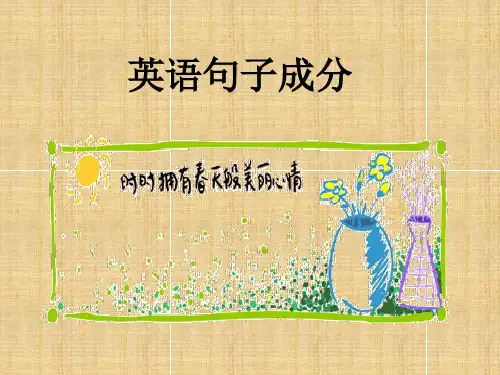
![英语句子结构讲解英语句子成分分析[最新版150张]](https://uimg.taocdn.com/6a4eb64a59eef8c75fbfb381.webp)
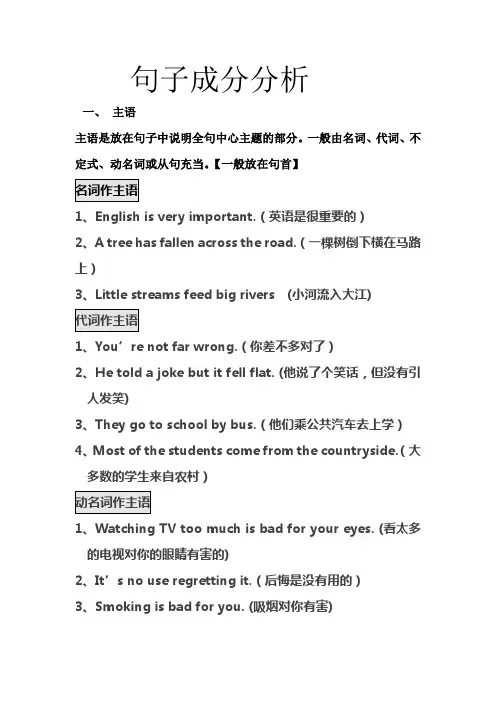
句子成分分析一、主语主语是放在句子中说明全句中心主题的部分。
一般由名词、代词、不定式、动名词或从句充当。
【一般放在句首】1、English is very important.(英语是很重要的)2、A tree has fallen across the road.(一棵树倒下横在马路上)3、Little streams feed big rivers (小河流入大江)1、You’re not far wrong.(你差不多对了)2、He told a joke but it fell flat. (他说了个笑话,但没有引人发笑)3、They go to school by bus.(他们乘公共汽车去上学)4、Most of the students come from the countryside.(大多数的学生来自农村)1、Watching TV too much is bad for your eyes. (看太多的电视对你的眼睛有害的)2、It’s no use regretting it.(后悔是没有用的)3、Smoking is bad for you. (吸烟对你有害)4、To see is to believe.(眼见为实/百闻不如一见)5、It is very hard to get to sleep.(入睡很难。
)6、To find your way can be a problem.(你能否找到路可能是一个问题。
)7、It would be nice to see him again. (如能见到他,那将是一件愉快的事。
)1、Three is enough. (三个就够了)2、Four from seven leaves three.(7减4还剩3)1、Whenever you are ready will be fine. (你无论什么时候准备好都行。
)2、Because Sally wants to leaves doesn’t mean that we have to.(不能说萨利要走因而我们也得走。
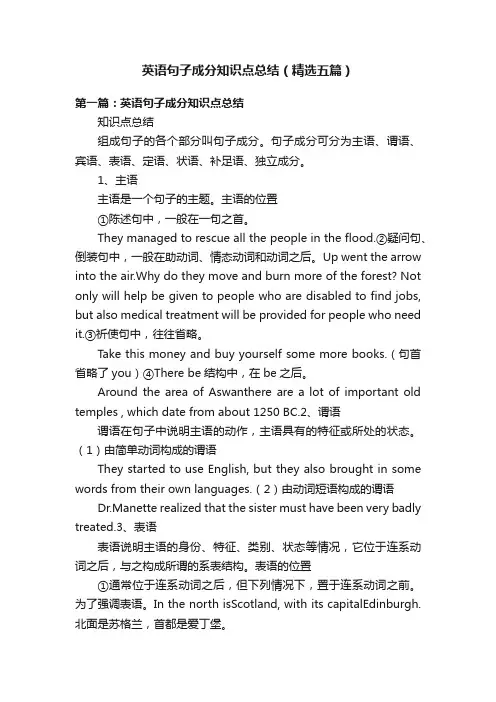
英语句子成分知识点总结(精选五篇)第一篇:英语句子成分知识点总结知识点总结组成句子的各个部分叫句子成分。
句子成分可分为主语、谓语、宾语、表语、定语、状语、补足语、独立成分。
1、主语主语是一个句子的主题。
主语的位置①陈述句中,一般在一句之首。
They managed to rescue all the people in the flood.②疑问句、倒装句中,一般在助动词、情态动词和动词之后。
Up went the arrow into the air.Why do they move and burn more of the forest? Not only will help be given to people who are disabled to find jobs, but also medical treatment will be provided for people who need it.③祈使句中,往往省略。
Take this money and buy yourself some more books.(句首省略了you)④There be结构中,在be之后。
Around the area of Aswanthere are a lot of important old temples , which date from about 1250 BC.2、谓语谓语在句子中说明主语的动作,主语具有的特征或所处的状态。
(1)由简单动词构成的谓语They started to use English, but they also brought in some words from their own languages.(2)由动词短语构成的谓语Dr.Manette realized that the sister must have been very badly treated.3、表语表语说明主语的身份、特征、类别、状态等情况,它位于连系动词之后,与之构成所谓的系表结构。
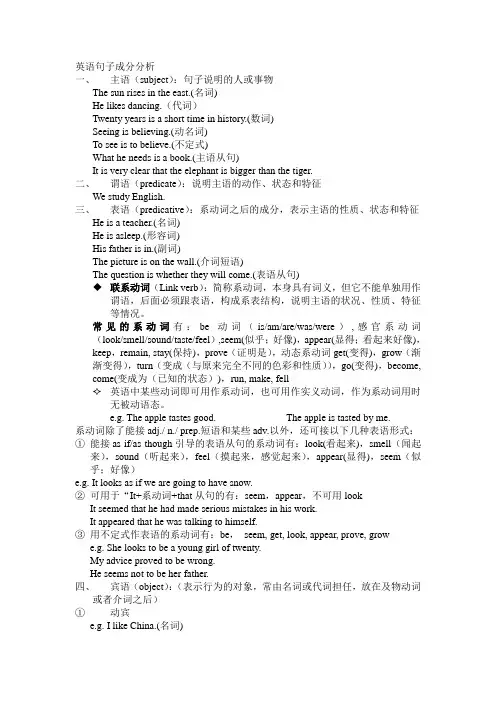
英语句子成分分析一、主语(subject):句子说明的人或事物The sun rises in the east.(名词)He likes dancing.(代词)Twenty years is a short time in history.(数词)Seeing is believing.(动名词)To see is to believe.(不定式)What he needs is a book.(主语从句)It is very clear that the elephant is bigger than the tiger.二、谓语(predicate):说明主语的动作、状态和特征We study English.三、表语(predicative):系动词之后的成分,表示主语的性质、状态和特征He is a teacher.(名词)He is asleep.(形容词)His father is in.(副词)The picture is on the wall.(介词短语)The question is whether they will come.(表语从句)◆联系动词(Link verb):简称系动词,本身具有词义,但它不能单独用作谓语,后面必须跟表语,构成系表结构,说明主语的状况、性质、特征等情况。
常见的系动词有:be动词(is/am/are/was/were),感官系动词(look/smell/sound/taste/feel),seem(似乎;好像),appear(显得;看起来好像),keep,remain, stay(保持),prove(证明是),动态系动词get(变得),grow(渐渐变得),turn(变成(与原来完全不同的色彩和性质)),go(变得),become, come(变成为(已知的状态)),run, make, fell✧英语中某些动词即可用作系动词,也可用作实义动词,作为系动词用时无被动语态。
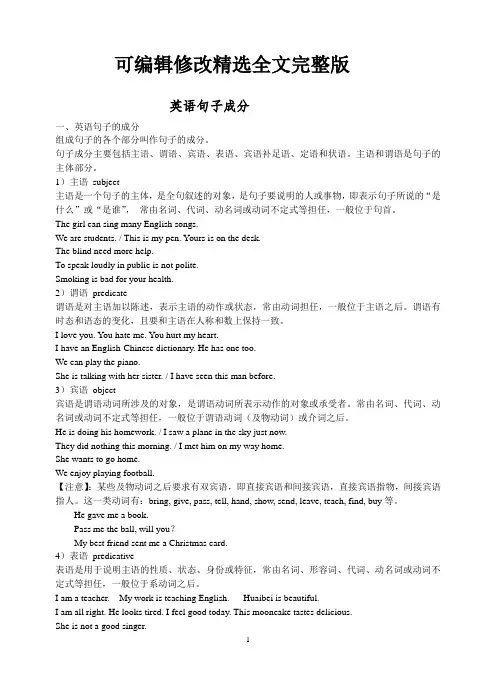
可编辑修改精选全文完整版英语句子成分一、英语句子的成分组成句子的各个部分叫作句子的成分。
句子成分主要包括主语、谓语、宾语、表语、宾语补足语、定语和状语。
主语和谓语是句子的主体部分。
1)主语subject主语是一个句子的主体,是全句叙述的对象,是句子要说明的人或事物,即表示句子所说的“是什么”或“是谁”,常由名词、代词、动名词或动词不定式等担任,一般位于句首。
The girl can sing many English songs.We are students. / This is my pen. Yours is on the desk.The blind need more help.To speak loudly in public is not polite.Smoking is bad for your health.2)谓语predicate谓语是对主语加以陈述,表示主语的动作或状态,常由动词担任,一般位于主语之后。
谓语有时态和语态的变化,且要和主语在人称和数上保持一致。
I love you. You hate me. You hurt my heart.I have an English-Chinese dictionary. He has one too.We can play the piano.She is talking with her sister. / I have seen this man before.3)宾语object宾语是谓语动词所涉及的对象,是谓语动词所表示动作的对象或承受者。
常由名词、代词、动名词或动词不定式等担任,一般位于谓语动词(及物动词)或介词之后。
He is doing his homework. / I saw a plane in the sky just now.They did nothing this morning. / I met him on my way home.She wants to go home.We enjoy playing football.【注意】:某些及物动词之后要求有双宾语,即直接宾语和间接宾语,直接宾语指物,间接宾语指人。
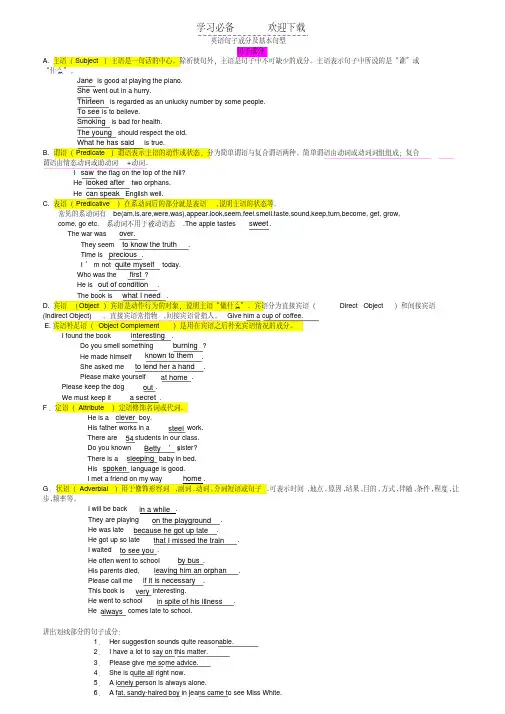
英语句子成分及基本句型句子成分A. 主语(Subject)主语是一句话的中心。
除祈使句外,主语是句子中不可缺少的成分。
主语表示句子中所说的是“谁”或“什么”。
Jane is good at playing the piano.She went out in a hurry.Thirteen is regarded as an unlucky number by some people.To see is to believe.Smoking is bad for health.The young should respect the old.What he has said is true.B. 谓语(Predicate)谓语表示主语的动作或状态,分为简单谓语与复合谓语两种。
简单谓语由动词或动词词组组成;复合谓语由情态动词或助动词+动词。
I saw the flag on the top of the hill?He looked after two orphans.He can speak English well.C. 表语(Predicative)在系动词后的部分就是表语,说明主语的状态等。
常见的系动词有be(am,is,are,were,was),appear,look,seem,feel,smell,taste,sound,keep,turn,become, get, grow,come, go etc.系动词不用于被动语态.The apple tastes sweet.The war was over.They seem to know the truth.Time is precious.I’m not quite myself today.Who was the first?He is out of condition.The book is what I need.D. 宾语(Object)宾语是动作行为的对象,说明主语“做什么”。
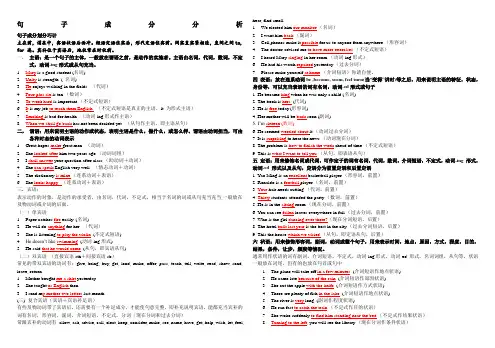
句子成分分析句子成分划分巧计主在前,谓在中,宾语状语后面冲。
短语定语住宾后,形代定语住宾前。
间宾直宾紧相连,直间之间to, for 连。
宾补位于宾语后,地状常在时状前。
一,主语:是一个句子的主体,一般放在谓语之前,是动作的实施者。
主语由名词,代词,数词,不定式,动词-ing形式或从句充当。
1.Mary is a good student.(名词)2.Unity is strength. ( 名词)3.He enjoys walking in the fields. (代词)4.Four plus six is ten.(数词)5.To work hard is important.(不定式短语)6.It is my job to teach them English. (不定式短语是真正的主语,it 为形式主语)7.Smoking is bad for health. (动词-ing形式作主语)8.When we shall go back has not been decided yet. (从句作主语,即主语从句)二,谓语:用来说明主语的动作或状态,表明主语是什么,做什么,或怎么样。
谓语由动词担当,可由各种时态的动词表示1.Great hopes make great men. (动词)2.She looked after him two years ago.(动词词组)3.I shall answer your question after class.(助动词+动词)4.She can speak English very well. (情态动词+动词)5.The dictionary is mine.(连系动词+表语)6.She looks happy. (连系动词+表语)三,宾语:表示动作的对象,是动作的承受者,由名词,代词,不定式,相当于名词的词或从句充当充当,一般放在及物动词或介词的后面。
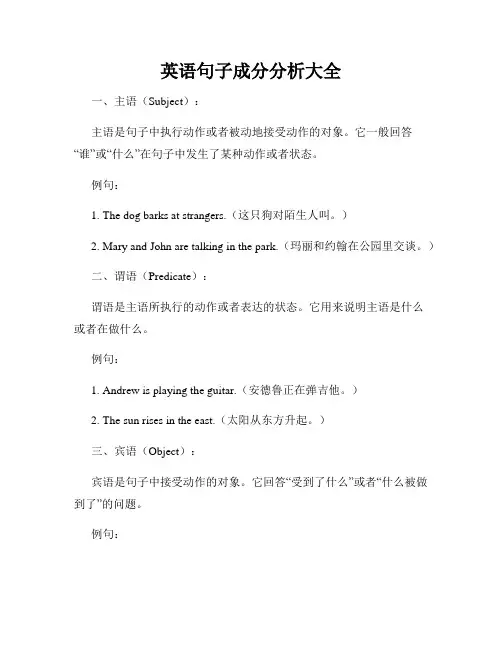
英语句子成分分析大全一、主语(Subject):主语是句子中执行动作或者被动地接受动作的对象。
它一般回答“谁”或“什么”在句子中发生了某种动作或者状态。
例句:1. The dog barks at strangers.(这只狗对陌生人叫。
)2. Mary and John are talking in the park.(玛丽和约翰在公园里交谈。
)二、谓语(Predicate):谓语是主语所执行的动作或者表达的状态。
它用来说明主语是什么或者在做什么。
例句:1. Andrew is playing the guitar.(安德鲁正在弹吉他。
)2. The sun rises in the east.(太阳从东方升起。
)三、宾语(Object):宾语是句子中接受动作的对象。
它回答“受到了什么”或者“什么被做到了”的问题。
例句:1. The teacher assigns homework to the students.(老师布置作业给学生。
)2. She bought a new car.(她买了一辆新车。
)四、表语(Predicate Nominative/Predicate Adjective):表语是用来说明主语的身份、性质、状态或者特征的成分。
它通常位于系动词后面,与主语相连。
例句:1. The cake smells delicious.(蛋糕闻起来很好吃。
)2. He became a doctor.(他成为了一名医生。
)五、定语(Adjective):定语用来修饰名词或者代词,可以说明它们的性质、状态或者特征。
例句:1. I saw a black cat.(我看到了一只黑猫。
)2. This is an interesting book.(这是一本有趣的书。
)六、状语(Adverb):状语用来修饰动词、形容词、副词或者全句,可以说明方式、时间、地点、原因等。
例句:1. Tom quickly ran to catch the bus.(汤姆快速地跑过去赶公交车。
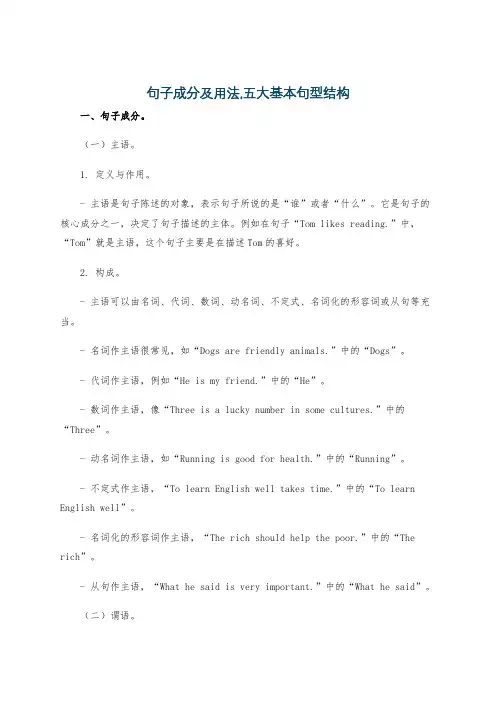
句子成分及用法,五大基本句型结构一、句子成分。
(一)主语。
1. 定义与作用。
- 主语是句子陈述的对象,表示句子所说的是“谁”或者“什么”。
它是句子的核心成分之一,决定了句子描述的主体。
例如在句子“Tom likes reading.”中,“Tom”就是主语,这个句子主要是在描述Tom的喜好。
2. 构成。
- 主语可以由名词、代词、数词、动名词、不定式、名词化的形容词或从句等充当。
- 名词作主语很常见,如“Dogs are friendly animals.”中的“Dogs”。
- 代词作主语,例如“He is my friend.”中的“He”。
- 数词作主语,像“Three is a lucky number in some cultures.”中的“Three”。
- 动名词作主语,如“Running is good for health.”中的“Running”。
- 不定式作主语,“To learn English well takes time.”中的“To learn English well”。
- 名词化的形容词作主语,“The rich should help the poor.”中的“The rich”。
- 从句作主语,“What he said is very important.”中的“What he said”。
(二)谓语。
1. 定义与作用。
- 谓语是对主语动作或状态的陈述或说明,指出“做什么”“是什么”或者“怎么样”。
在句子中,谓语动词的形式要与主语的人称和数保持一致。
例如在“Mary sings beautifully.”中,“sings”就是谓语,它描述了Mary的动作。
2. 构成。
- 谓语一般由动词充当,包括实义动词、系动词、助动词和情态动词等。
- 实义动词可以独立作谓语,表示具体的动作,如“eat”“drink”“run”等。
例如“He eats an apple.”中的“eats”。
英语句⼦成分及句⼦结构英语句⼦基本构成成分:主语:可以作主语的成分有名词(如boy),主格代词(如I ,we, he, she, they ),数词、动词不定式,动名词等。
最常⽤的便是名词、代词、动名词、动词不定式。
主语⼀般在句⾸。
(1)名词作主语English is very important. 英语是很重要的。
The students all love their English teacher. 这些学⽣都爱他们的英语⽼师。
(2)代词作主语They go to school by bus. 他们乘公共汽⻋上学。
(3)动名词作主语Watching TV too much is bad for your eyes.看电视太多对你的眼睛是有害的。
It’s no use regretting it. 后悔是⽆⽤的。
(4)动词不定式(短语)作主语To see is to believe. 眼⻅为实。
△It is necessary to master a foreign language.掌握⼀⻔外语是很必要的谓语:谓语由动词构成,谓语时态、语态的变化都体现在动词的变化上,⼀般在主语之后。
1)及物动词作谓语We should help each other. 我们应该互相帮助。
All of the students like the novel. 所有这些学⽣都喜欢这本⼩说。
2)不及物动词作谓语He arrived yesterday. 他昨天到了。
The teacher came in, book in hand. ⽼师⾛进教室,⼿⾥拿着书。
3)连系动词作谓语(实际为系表结构)He looks worried.他看起来很担⼼。
The box itself is not so heavy. 箱⼦本身并不重。
4)复合谓语:①由情态动词加动词原形构成。
如:You may keep the book for two weeks.②由助动词加动词原形,现在分词,过去分词构成。
Different parts of a sentence概念句子是由词按照一定的语法结构组成的。
组成句子的各个部分叫做句子的成分。
句子的成分包括:主语、谓语、表语、宾语(直接和间接宾语)、宾语补足语、定语和状语。
主语和谓语是句子的主体部分(在英语中,一般句子必须有主语和谓语),表语、宾语和宾语的补足语是谓语里的组成部分。
其他成份如定语和状语是句子的次要成分。
▲句子成分分类1.主语主语是谓语讲述的对象,表示所说的“是什么”或“是谁”。
一般由名词、代词、不定代词或相当于名词的单词或短语来充当,也有从句充当的现象。
大多数主语都在句首。
如:讲述“谁”We work in a big factory.讲述“什么”The classroom is very big.1).名词作主语。
如:A tree has fallen across the road. (一棵树倒下横在路上。
) 2).代词用作主语。
如:You’re not far wrong. (你差不多对了)。
3).数词用作主语。
如:Three is enough. 三个就够了。
4).名词化的形容词用作主语。
The idle are forced to work. 懒汉被迫劳动。
Old and young marched side by side. 老少并肩而行。
5).副词用作主语。
如:Now is the time. 现在是时候了。
Carefully does it. 小心就行。
6).名词化的介词作主语。
如:The ups and downs of life must be taken as they come.我们必须承受人生之沉浮。
7).不定式用作主语。
To find your way can be a problem.你能否找到路可能是一个问题。
It would be nice to see him again. 如能见到他,那将是一件愉快的事。
英语句子成分分析(最完整版)一、主语主语是英语句子的核心成分,它表示句子所说的是谁或什么。
主语通常由名词、代词、名词短语或动名词等充当。
例如:1. The cat is sleeping on the sofa.(猫正在沙发上睡觉。
)在这个句子中,"The cat"是主语,表示句子谈论的是猫。
2. They are playing basketball.(他们正在打篮球。
)这里,"They"作为主语,指代了一群人。
二、谓语谓语是句子中表示动作、状态或存在意义的词或词组。
谓语通常由动词或动词短语构成。
例如:1. She reads a book every day.(她每天读一本书。
)在这个句子中,"reads"是谓语,表示主语"她"的动作。
2. The flowers are blooming.(花儿正在绽放。
)这里,"are blooming"作为谓语,描述了主语"The flowers"的状态。
三、宾语宾语是接受动作的对象,分为直接宾语和间接宾语。
直接宾语表示动作的承受者,而间接宾语表示动作的方向或受益者。
例如:1. I eat an apple.(我吃一个苹果。
)在这个句子中,"an apple"是直接宾语,表示动作"eat"的承受者。
2. She gave me a gift.(她给了我一个礼物。
)这里,"a gift"是直接宾语,表示动作"gave"的承受者;"me"是间接宾语,表示动作的方向。
四、表语表语用来补充说明主语的身份、特征或状态,通常位于系动词(如be、look、seem等)之后。
例如:1. He is a teacher.(他是一名教师。
)在这个句子中,"a teacher"是表语,说明主语"He"的身份。